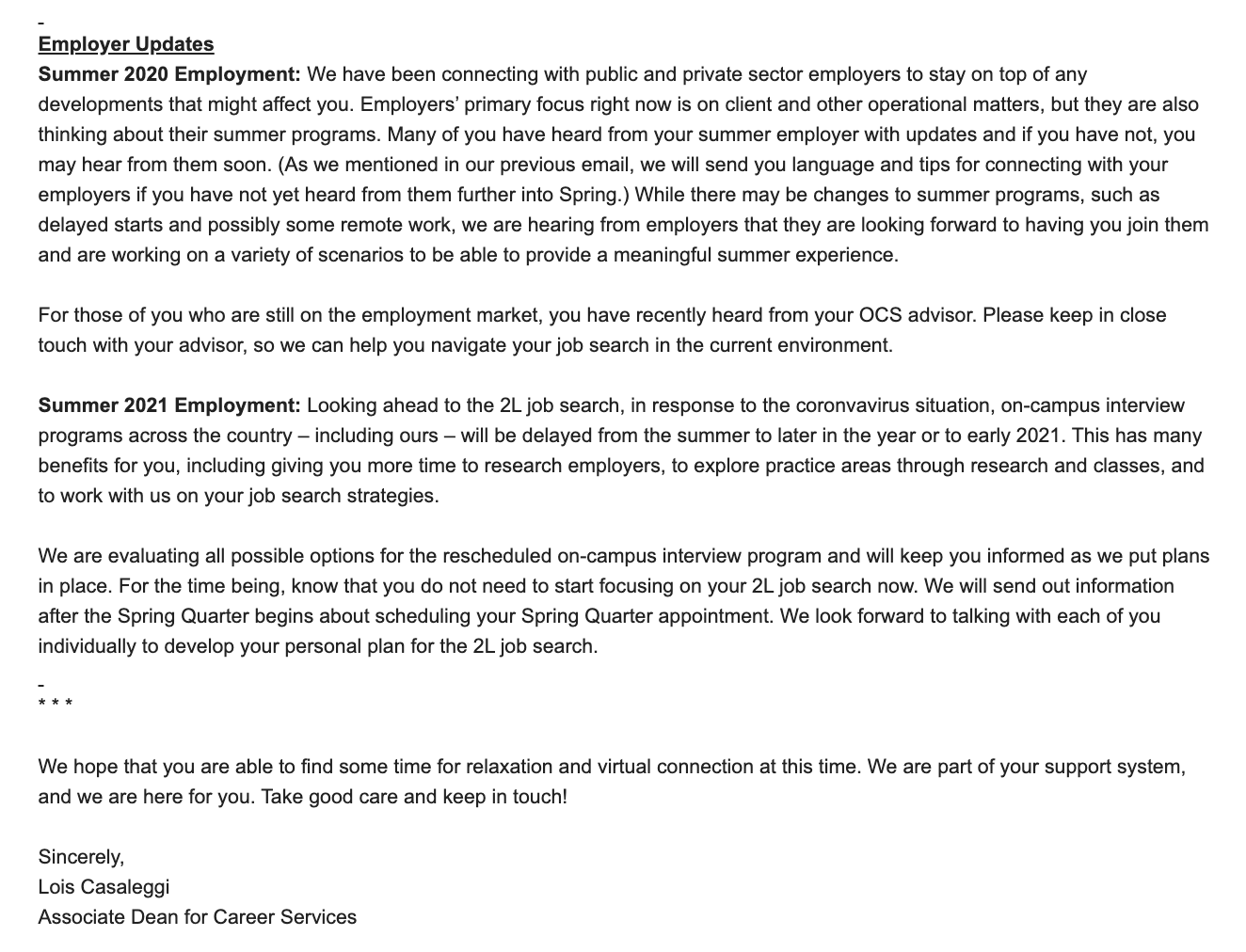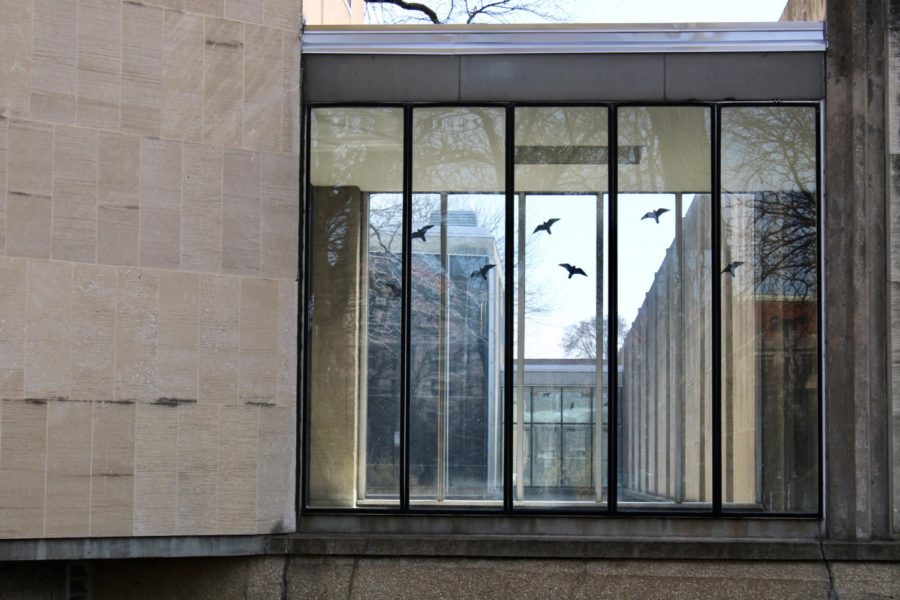The University of Chicago Law School plans to keep its “status quo” grading system for spring quarter, Dean Tom Miles told students in an email on Tuesday, despite a push by some students to move to a pass/fail system.
The choice contrasts with those of a number of other top law programs—including Harvard, Yale, Columbia, and Cornell—that have switched to blanket pass/fail or equivalent grading for the spring term, after the response to the coronavirus pandemic disrupted many students’ plans.
“Student opinion here, as at other schools, is sharply divided, and any path is sure to disappoint many students,” Miles wrote in Tuesday’s email. He said he reached the decision after speaking with employers and reading student and faculty input.
The email stipulated that the choice isn’t yet set in stone. In response to students who sent him direct emails advocating for a pass/fail policy, Miles wrote, “We will continue to assess information as it arrives and remain prepared to make a change if warranted.”
Students’ criticism of administrators intensified after Miles told students and faculty over email Saturday evening that three members of the Law School had received clinical diagnoses of COVID-19. “All three developed symptoms after they were no longer present in the Law School,” Miles wrote, adding that they posed “no added risk to our community.”
The Saturday email contained no mention of grading. Law students will resume classes on Monday—whereas spring break has been extended for another week in other parts of the University, including the College—and will attend their courses over Zoom digital conferences.
“There isn’t any clarity on how they made the decision about grades or how they’re going to adjust when more students or professors get sick,” second-year law student Caelin Miltko told The Maroon on Saturday. “One of the things that concerned me most about the initial email—and even more now—is that there are a lot of reasons to think that this pandemic is only going to make inequities that already exist in the law school worse.”
One student in favor of relaxing grading requirements for spring term, who asked not to be named, said she thought administrators had already mismanaged the crisis by choosing to hold exams in winter quarter, between March 10 and March 14. Administrators announced on March 10 that large gatherings would be suspended, exempting classes. The University then announced on March 12 that spring quarter would be remote, and urged undergraduate students to move out of housing by the end of winter quarter.
“People who had in-person exams, including all 1Ls, had to skirt CDC guidelines to go to the law school and take in-person exams that will be graded on the law school’s traditional curve. Think 100 people crowding in a classroom to take a bankruptcy exam,” she said, adding that “coughs were audible.”
She said that supports a blanket pass/fail policy because, if the grading system is not adjusted, “countless exceptions” will have to be made. For instance, people with mild cases may be too ill to partake in classes. “So, the case-by-case system is also vulnerable to abuse.”
Students Split Over Grading Policy
The week before Miles announced that it would not alter its grading policy, students circulated an open letter arguing for a satisfactory/unsatisfactory system. The letter drew 288 signatures from current students.
“We understand that this switch may complicate calculations for scholarship awards, journal placement, and rankings,” the letter in favor of a pass/fail system reads. However, “students may not have the time or capacity to think about class rank or graduation awards in the midst of this international pandemic.”
Another open letter, arguing against mandatory pass/fail, drew only a handful of signatures—though several students said their peers had sent private notes to administrators urging the school not to do away with grades. The letter was originally public, but has been taken down.
Students who oppose a pass/fail system argue that substantive grades are particularly important for first years. Spring-quarter grades—which the UChicago Law weighs as about 50 percent of a first year’s grade total—are an opportunity for students who did not attend elite colleges, and had a rocky start to law school, to boost their GPAs.
“Switching to mandatory P/F would unfairly reward students who did extremely well in prior quarters while denying students who took a longer time to find their groove and ‘get’ law school the opportunity to improve. This impact falls most heavily on first-generation professional students like me,” a current second-year law student told The Maroon.
Proponents of a mandatory pass/fail scheme, meanwhile, say that social distancing could mean students—including law students with their own children or other dependents—may be forced to study in a distracting space.
“The real issue is that some students may face more disruption than others,” Tom Ginsburg, a professor in international law, told The Maroon. The dean of students is reaching out to students to determine who has been affected, Ginsburg said. “If that number is small, I’d favor keeping our current system, but if the number is large, we may have to revisit.”
Effects on Job Recruitment
Max Freedman (A.B. ’18), a second-year in the Law School, told The Maroon he initially signed the petition in favor of keeping the status quo, partly out of concern for students’ job prospects.
“We’re staring into the abyss of a recession,” Freedman said. While second- and third-years are in positions of “relative privilege,” since many have secured return offers, he said a mandatory pass/fail policy could mean more uncertainty for first-years. Recruiters for big-name law firms like Skadden indicated that without spring-term grades, they will delay hiring, he explained.
The day after Miles’s email informed students that the Law School did not plan to alter the grading system, an administrator in career services informed students that on-campus interviewing (OCI) would be delayed.
“Looking ahead to the 2L job search, in response to the coronvavirus [sic] situation, on-campus interview programs across the country – including ours – will be delayed from the summer to later in the year or to early 2021,” Lois Casaleggi, associate dean for career services, wrote to first-year law students in an email. A separate email informed second-years that OCI would be delayed indefinitely.

“I was like, well, if you’re going to do that, what’s the point? Who are we protecting now, if you’re going to delay recruiting anyway?” Freedman said. He changed his mind, and signed on to the petition for a satisfactory/unsatisfactory grading system.
Others say the decision to retain letter grades could put UChicago students at a disadvantage, as peer schools adopt alternative models.
“Everybody else who we’re competing against will have done mandatory pass/fail,” Miltko said. “Employers prefer a grade because it makes it easier for them to screen out applications, and there’s really no good reason for Chicago to make it that much easier.”
“Multiple professors have told me they think the Dean’s decision comes from the fear of a tight job market in coming months and that UChicago grades will help our students stand out,” another 2L student said. “Although I buy the argument that grades generally are better than a pass, I’m not convinced that poor grades are better.”
Tuition and Grades
As peer schools announced that they would switch to alternative grading schemes, UChicago law professors took to Twitter and blogs to debate the merits of a modified system.
“At the most basic level, grades are a product we offer our students,” professor Adam Chilton wrote. It’s possible pass/fail will eventually become necessary, Chilton said in a Twitter post, but “given the rough upcoming hiring market, we should not do deprive our students of the assessment grades offer just yet.”
“I agree with this in theory,” another UChicago law professor, Tony Casey, responded. “But how do we know when it becomes too much noise?”
Chicago Law Efficiency Brigade, a Twitter account that satirizes the University of Chicago’s free-market “Law and Economics” tradition, tweeted jokes about the new policy. “RIGHT NOW, THE MOST IMPORTANT THING IS TO SEPARATE THE (ACADEMICALLY) STRONG FROM THE WEAK.”
Others argue that substantive grades are part of what students pay for at an expensive program like UChicago.
“A lot of students have paid a pretty exorbitant [amount] of money to attend Chicago Law,” one current law student told The Maroon. “I'm sure that a lot of the expected value for students is quality of education and networking, but grades are a big part of that too, because of the signal they send to employers. Grades clearly matter.”
The student asked to remain anonymous, because, he said, he’s part of some meme pages in which people who have expressed criticism of a mandatory pass/fail or A/A-minus grading policy have been subject to “borderline online harassment.”
Another student said he has seen “open threats” leveled against students who oppose mandatory pass/fail or equivalent grading policies. He pointed to a group chat for current second-year law students. One proponent of modified grading had written: “all of you who oppose this or any measure to help your classmates, we know who you are. The law schools can not accommodate students suffering from a pandemic on a case-by-case basis.”
“And you have no business being Supreme Court clerks or getting fancy law job positions,” the student went on. “And again, we know who you are.”
Accommodations for Affected Students
In recent days, administrators held virtual “town halls” with students and circulated a handbook in preparation for spring quarter. Students who need accommodations have been instructed to speak with professors and with the dean of students, who will determine the best course of action on a case-by-case basis.
“In normal times, the Law School provides support to its students so that everyone may take full advantage of the legal education we offer. This includes support for students who suffer illness and other personal challenges,” Miles said in an email to The Maroon.
Asked whether there is protocol in place if a student falls ill or is unable to attend class due to COVID-19, Miles said that “students may follow the procedures they usually would to obtain an accommodation. As with any illness, students may qualify for exams to be rescheduled.”
Some critics say that the case-by-case system creates too much uncertainty.
Freedman told The Maroon he thinks administrators should be more clear about grading procedure in the event that students fall ill with coronavirus. In resources like the Law School’s spring-quarter handbook, he said, “there are words, but not a ton of answers. I think people would feel better if they knew a range of options.”
“When someone asks during this town hall, ‘What happens if you’re sick?’ the beginning of the answer shouldn’t be, ‘We hope it doesn’t happen.’”









